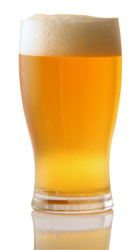
Poll: If you had to choose a house yeast
#1

Posted 02 July 2009 - 09:21 AM
#2

Posted 02 July 2009 - 09:34 AM
#3

Posted 02 July 2009 - 09:37 AM
#4

Posted 02 July 2009 - 09:51 AM
#5

Posted 02 July 2009 - 10:12 AM
#6

Posted 02 July 2009 - 10:15 AM
#7

Posted 02 July 2009 - 10:19 AM
#8

Posted 02 July 2009 - 10:36 AM
#9

Posted 02 July 2009 - 10:38 AM
My guess would be the cost savings.I'd vote but I haven't used them all so I'm not in a position to provide reliable feedback.Pardon my ignorance....What do you mean by house yeast? One that you use for everything?If so, why would you do that?
#10

Posted 02 July 2009 - 10:43 AM
It's more than cost savings, although that's certainly a factor. It really helps to get to know one yeast strain inside and out and how to make it perform the way you want it to. Each strain has its own personality, if you will, and to make the most effective use of any yeast, you need to know that personality well.My guess would be the cost savings.I'd vote but I haven't used them all so I'm not in a position to provide reliable feedback.
#11

Posted 02 July 2009 - 10:49 AM
It would also be neat to test the limits of the strain to perform under different conditions (alcohol levels, temperature, etc.).It's more than cost savings, although that's certainly a factor. It really helps to get to know one yeast strain inside and out and how to make it perform the way you want it to. Each strain has its own personality, if you will, and to make the most effective use of any yeast, you need to know that personality well.
#12

Posted 02 July 2009 - 10:53 AM
Yeah, that's what I meant by "learning its personality".It would also be neat to test the limits of the strain to perform under different conditions (alcohol levels, temperature, etc.).
#13

Posted 02 July 2009 - 11:00 AM
I figured you'd take the yeast out for coffee or something, maybe dinner - see where things go from there...Yeah, that's what I meant by "learning its personality".
#14

Posted 02 July 2009 - 11:28 AM
My noobish beer philosophy thus far has been to use a strain suitable for the style being brewed. Given that I am clueless as to beer yeast strains, that means I read yeast descriptions somewhere, look up the style I'm making, and buy what they tell me is appropriate.I get the impression from the original poster that the intent here is to use a single yeast strain for many difference styles. Is that a common choice? Can knowing your yeast's "personality" trump using a strain that is theoretically more appropriate for the style?It's more than cost savings, although that's certainly a factor. It really helps to get to know one yeast strain inside and out and how to make it perform the way you want it to. Each strain has its own personality, if you will, and to make the most effective use of any yeast, you need to know that personality well.
#15

Posted 02 July 2009 - 11:40 AM
#16

Posted 02 July 2009 - 11:47 AM
I'm with you on this - I think there is some flexibility on what strain you use for a style of beer but certain strains are just unlikely to work out well for certain styles. The yeast is important which is why I use a variety. 1056 is certainly the most common though since it works for most american styles that I make.My noobish beer philosophy thus far has been to use a strain suitable for the style being brewed. Given that I am clueless as to beer yeast strains, that means I read yeast descriptions somewhere, look up the style I'm making, and buy what they tell me is appropriate.I get the impression from the original poster that the intent here is to use a single yeast strain for many difference styles. Is that a common choice? Can knowing your yeast's "personality" trump using a strain that is theoretically more appropriate for the style?
#17
 *_Guest_Blktre_*
*_Guest_Blktre_*
Posted 02 July 2009 - 11:48 AM
#18

Posted 02 July 2009 - 11:53 AM
I'm not so sure it would trump it, but certainly wouldn't be inappropriate if you're aware of the yeast's behavior in the conditions you're intending to use. In the example, 1272 is quite estery at warmer temps and quite clean with a touch of fruit at lower temps. I think this would make an excellent english/american compromise strain.There are certainly things that you couldn't get any of those yeasts to do (e.g. produce belgian character).I think there is value in maintaining a house yeast. After all, this is how all these great yeasts we use evolved and adapted into what they are recognized for today.Can knowing your yeast's "personality" trump using a strain that is theoretically more appropriate for the style?
#19

Posted 02 July 2009 - 11:56 AM
Oh yeah, that definitely changes the complexion of the issue, when you have to drop $500 for your yeast.In that case, I'd lean toward your first choice, the 1272. This one is of course good for the APAs, IPAs, etc. However, it has more character/fruitiness than the 1056, and could probably do a pretty decent job on the English styles. Especially if you learn how to tweak it for your style. Like maybe a higher fermentation temperature for an ESB in order to throw more esters?Good Feedback. The reason I am in this dilemma is because it is for commercial brewing, and yeast costs about $500 so I have to be damn sure I'm going to re-use it several times. I'd prefer choosing the proper yeast for the proper style, but then I'd have to choose American or British beers exclusively until we have the production rate needed to maintain multiple strains. If I can choose a house yeast it allows me to come out with multiple varieties within the summer, but not if it's at the cost of quality.I've never used a yeast strain out of style, so I don't know how well it can work. I have more planning to do.
#20

Posted 02 July 2009 - 12:01 PM
Aren't WLP002 and WY1968 the same thing, basically the Fullers strain? Out of curiosity, how do you get proper attenuation out of that strain for American ales, especially AIPAs, very low mash temps?Its not on the list, and i normally use Wyeast, but if i had to choose a strain thats falls into your category, it would be WL002. Pretty much any American or English style. Ferments hard and is extremely clear.
0 user(s) are reading this topic
0 members, 0 guests, 0 anonymous users












